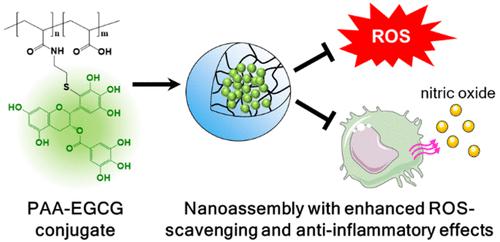当前位置:
X-MOL 学术
›
ACS Macro Lett.
›
论文详情
Our official English website, www.x-mol.net, welcomes your
feedback! (Note: you will need to create a separate account there.)
Autoxidation-Resistant, ROS-Scavenging, and Anti-Inflammatory Micellar Nanoparticles Self-Assembled from Poly(acrylic acid)–Green Tea Catechin Conjugates
ACS Macro Letters ( IF 5.1 ) Pub Date : 2022-06-17 , DOI: 10.1021/acsmacrolett.2c00239 Ki Hyun Bae 1 , Kiat Hwa Chan 2 , Motoichi Kurisawa 1
ACS Macro Letters ( IF 5.1 ) Pub Date : 2022-06-17 , DOI: 10.1021/acsmacrolett.2c00239 Ki Hyun Bae 1 , Kiat Hwa Chan 2 , Motoichi Kurisawa 1
Affiliation

|
(−)-Epigallocatechin-3-O-gallate (EGCG), the most bioactive catechin in green tea, has drawn significant interest as a potent antioxidant and anti-inflammatory compound. However, the application of EGCG has been limited by its rapid autoxidation at physiological pH, which generates cytotoxic levels of reactive oxygen species (ROS). Herein, we report the synthesis of poly(acrylic acid)–EGCG conjugates with tunable degrees of substitution and their spontaneous self-assembly into micellar nanoparticles with enhanced resistance against autoxidation. These nanoparticles not only exhibited superior oxidative stability and cytocompatibility over native EGCG, but also showed excellent ROS-scavenging and anti-inflammatory effects. This work presents a potential strategy to overcome the stability and cytotoxicity issues of EGCG, making it one step closer toward its widespread application.
中文翻译:

由聚(丙烯酸)-绿茶儿茶素偶联物自组装而成的抗自氧化、清除 ROS 和抗炎的胶束纳米粒子
(-)-表没食子儿茶素-3- O-没食子酸酯(EGCG)是绿茶中最具生物活性的儿茶素,作为一种有效的抗氧化剂和抗炎化合物引起了人们的极大兴趣。然而,EGCG 的应用受到其在生理 pH 值下的快速自氧化的限制,这会产生细胞毒性水平的活性氧 (ROS)。在此,我们报告了具有可调取代度的聚(丙烯酸)-EGCG 共轭物的合成及其自发自组装成胶束纳米粒子,从而增强了抗氧化能力。这些纳米颗粒不仅表现出优于天然EGCG的氧化稳定性和细胞相容性,而且表现出优异的ROS清除和抗炎作用。这项工作提出了一种潜在的策略来克服 EGCG 的稳定性和细胞毒性问题,
更新日期:2022-06-17
中文翻译:

由聚(丙烯酸)-绿茶儿茶素偶联物自组装而成的抗自氧化、清除 ROS 和抗炎的胶束纳米粒子
(-)-表没食子儿茶素-3- O-没食子酸酯(EGCG)是绿茶中最具生物活性的儿茶素,作为一种有效的抗氧化剂和抗炎化合物引起了人们的极大兴趣。然而,EGCG 的应用受到其在生理 pH 值下的快速自氧化的限制,这会产生细胞毒性水平的活性氧 (ROS)。在此,我们报告了具有可调取代度的聚(丙烯酸)-EGCG 共轭物的合成及其自发自组装成胶束纳米粒子,从而增强了抗氧化能力。这些纳米颗粒不仅表现出优于天然EGCG的氧化稳定性和细胞相容性,而且表现出优异的ROS清除和抗炎作用。这项工作提出了一种潜在的策略来克服 EGCG 的稳定性和细胞毒性问题,











































 京公网安备 11010802027423号
京公网安备 11010802027423号